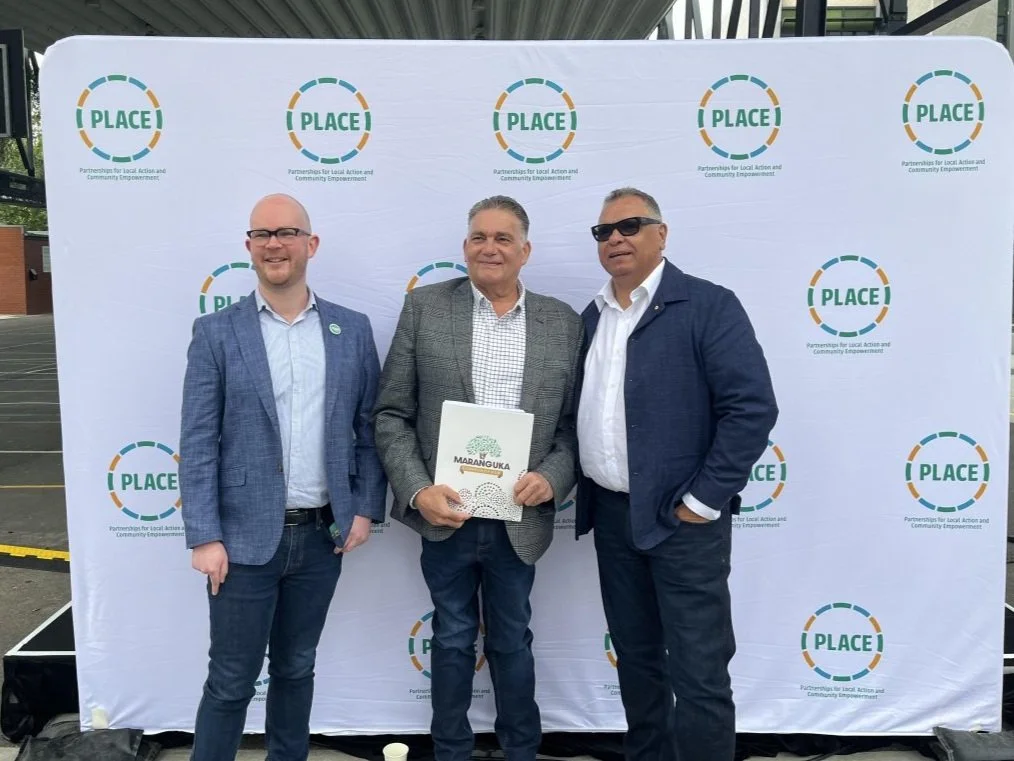New partnership targets disadvantage
Dr Luke Craven, Alistair Ferguson and Sean Gordon at the PLACE launch.
Systemic disadvantage is being targeted by a joint philanthropic and federal government investment to develop a national not-for-profit organisation designed to help the needs of local communities.
Partnerships for Local Action and Community Empowerment (PLACE) was launched on Wednesday morning at the Gowrie Carlton Learning Precinct in Naarm, with Federal Treasurer Jim Chalmers and Social Services Minister Amanda Rishworth alongside several philanthropic partners, spruiking the new venture.
"This is a passion of ours because too many kids in communities like mine are trapped in the cycle of intergenerational disadvantage," the Treasurer said.
"The best way to solve issues communities face is by listening to them, developing solutions led by local people."
The federal government's $19.3 million in funding over five years will be matched by give partners: the Minderoo Foundation, the Paul Ramsay Foundation, the Ian Potter Foundation, the Bryan Foundation, and the Dusseldorp Forum.
"The need for PLACE emerged from community, which called out the fragmented nature and widespread gaps in local capability of place-based work and the lack of shared learning and best practice solutions to make progress locally," Minister Rishworth said.
A place-based approach involves the partnering of governments and communities to develop long-term and collaborative solutions to social issues, tailored to the individual communities' needs.
The government said PLACE will be a "one-stop shop" to support and enhance place-based programs in a variety of areas, including early years, youth development, health, education, employment, and youth justice, and will focus on strengthening the capacity of communities to design and deliver these programs," by promoting evidence sharing and improving data governance.
Asked about how PLACE will help tackle disadvantage and drive multi-generation change in Indigenous communities, Minister Rishworth said: "When you speak with First Nations communities, what you hear from local leaders is they often know what is needed in their community."
"We often hear from First Nations leaders that the supports and programs they want in place should be informed by them themselves, and what PLACE will support those communities to do is to ensure that they can design those programs, they can attract funding, they can work with government to deliver."
Yadha Muru Foundation executive director and Gidgee Group Consulting and Partnerships director, Wangkumarra and Barkindji man Sean Gordon, said Aboriginal communities have been leading the way in place-based development "for a long time", arguing PLACE is a chance to "amplify" that work.
"Look at…what's working in one community, and can it be supported and duplicated to work in another community?" he said.
"One of the biggest challenges is… how do we support cross-country collaboration and understand…why we're having successes in one community. And…can it be supported in other communities to help fast track those communities in their place-based development."
Alistair Ferguson is the executive director and founder of Maranguka, Australia's first major Justice Reinvestment initiative, which is aimed at empowering Aboriginal communities.
He said he was hopeful PLACE would give the opportunity to provide "continuity between service delivery and implementation"—particularly concerning co-design and the shared decision-making process.
"With this process, we're able to capture the story through…storytelling and truth telling," he said.
"And I think it'll really provide the sort of foundation for communities to…reassess and assess ourselves in terms of what we really require to help us move forward."
Paul Ramsay Foundation chief executive Kristy Muir said despite wanting all families, children and communities across the country to thrive, this was not the case.
"This new not-for-profit, PLACE, is all about creating a community of communities. It's about providing those people and places doing incredible work in their communities, the kind of resources and supports they need to do that better, no matter where they're based," Professor Muir said.
This article was originally published on the National Indigenous Times and can be accessed here.

